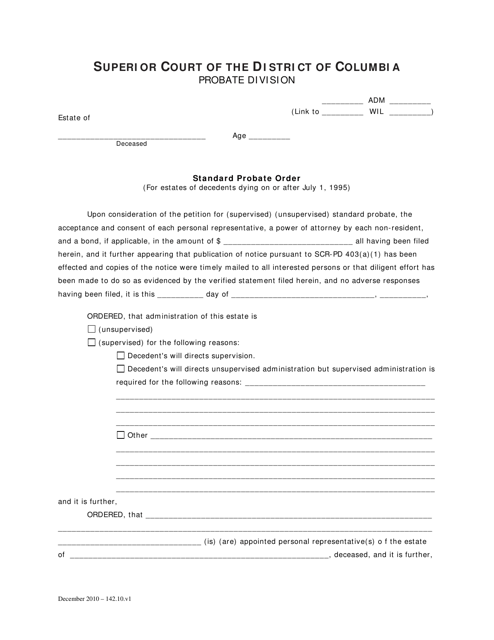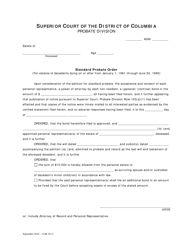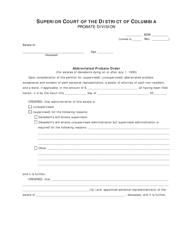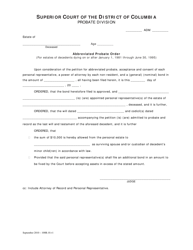Standard Probate Order (For Estates of Decedents Dying on or After July 1, 1995) - Washington, D.C.
Standard Probate Order (For Estates of Decedents Dying on or After July 1, 1995) is a legal document that was released by the District of Columbia Courts - a government authority operating within Washington, D.C..
FAQ
Q: What is a Standard Probate Order?
A: A Standard Probate Order is a legal document used in Washington, D.C. for estates of individuals who passed away on or after July 1, 1995.
Q: What is the purpose of a Standard Probate Order?
A: The purpose of a Standard Probate Order is to guide the probate process for the estate of a deceased person in Washington, D.C.
Q: When is a Standard Probate Order used?
A: A Standard Probate Order is used for estates of decedents who died on or after July 1, 1995, in Washington, D.C.
Q: What does the Standard Probate Order cover?
A: The Standard Probate Order covers various aspects of the probate process, including appointment of a personal representative, inventory of assets, payment of debts, distribution of assets, and other related matters.
Q: Do I need a lawyer to file a Standard Probate Order?
A: While not required, it is recommended to seek legal advice or assistance from an attorney specializing in probate matters when filing a Standard Probate Order.
Q: What happens after a Standard Probate Order is filed?
A: After a Standard Probate Order is filed, the Court will review the documents and appoint a personal representative to handle the administration of the estate.
Q: Are there any fees associated with filing a Standard Probate Order?
A: Yes, there are fees associated with filing a Standard Probate Order, including filing fees and fees for publication, if required.
Q: How long does the probate process take in Washington, D.C.?
A: The duration of the probate process in Washington, D.C. can vary depending on the complexity of the estate, but it typically takes several months to a year or longer.
Q: Can the Standard Probate Order be modified or contested?
A: Yes, the Standard Probate Order can be modified or contested by interested parties, such as beneficiaries or creditors, through appropriate legal procedures.
Form Details:
- Released on December 1, 2010;
- The latest edition currently provided by the District of Columbia Courts;
- Ready to use and print;
- Easy to customize;
- Compatible with most PDF-viewing applications;
- Fill out the form in our online filing application.
Download a fillable version of the form by clicking the link below or browse more documents and templates provided by the District of Columbia Courts.







